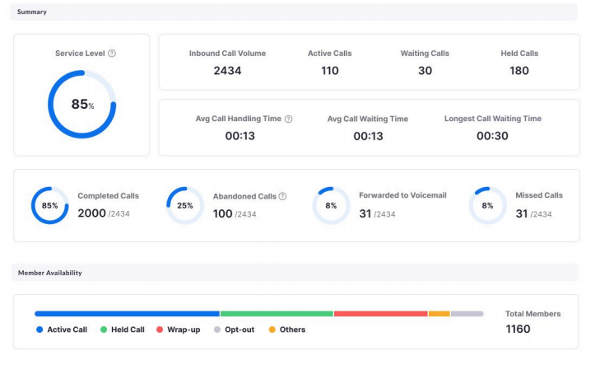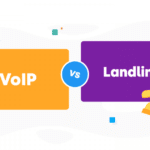10 Best Small Business Phone Plans in 2024

Over 70% of customers make purchases based on customer service quality*. “Quality”, of course, means short wait times and positive, personalized interactions. To enhance these customer experiences and boost your bottom line, having the right small business phone plan is key.
However, engaging leads or customers and tracking call performance requires more than just the basics. So how do you find the solution with all the features you need as you grow at a price that works as you scale?
In this article, we look at 10 of the best small business phone plans on the market in 2024. You’ll also find a more in-depth exploration of features that will save you significant time and stress.
Key takeaways:
- The best small business phone plans come with automated features to improve efficiency.
- As a small business, you should look for a solution that combines functionality and flexibility.
- CloudTalk offers both affordable scalability and extensive features to fit your business needs as you grow.
Scale your business with all the features you need, without seats you don’t.
What to Look For In A Small Business Phone Plan
Before we take a look at the best small business phone plans on the market, here are the key features you should look out for in your phone system. These apply whether it’s Voice Over Internet Protocol (VOIP/Wi-Fi) or data-usage-based:
- Automated features. Call center automation with features such as Call Queueing and Workflow Automation saves your team time and improves customer experience.
- Easy maintenance. Look out for a solution that you can easily set up and maintain with little to no IT support needed.
- Integrations. Streamline your workflows by choosing software that integrates with existing solutions such as your CRM and sales automation software.
- Data insights. To improve call center performance, opt for a solution that helps you track KPIs and customer interactions.
- Scalability. Try to find a solution that can support you as you grow or scale back — Cloudtallk, for example, comes with an adjustable seat count.
Best Small Business Phone Plans: Sneak Peek
Want a quick overview of the business phone plans on our list? Take a look at this table.
Best Small Business Phone Plans
Provider
Best For
Price
Ease of use
CloudTalk
Automated features, AI tools, performance optimization, and scalability.
Free 14 day trial. Starts at $25/month/seat.
Grasshopper
Very small businesses that want to project a professional image
Starts at $14/month/seat
RingCentral
Businesses requiring comprehensive communication tools including video and AI
Starts at $14.95/month/seat
Phone.com
Small teams, particularly in industries like healthcare, legal, and retail
Starts at $12.74/month/seat
Up to 8-digit extensions with site codes from a Premium plan.
Ooma
Very small teams needing flexible calling options and mobile integration.
Starts at $19.99/month/seat
Zoom Phone
Businesses already using Zoom, needing easy scalability and communication management
Starts at $10/month/seat
Google Voice
Small businesses, freelancers, and entrepreneurs looking for a low-cost VoIP system
Starts at $10/month/seat
AT&T
Larger or growing teams needing integrated phone, fax, and messaging solutions
Starts at $35/month/seat
Or, keep reading for more detailed tool descriptions, user reviews, and why it’s made our shortlist.
10 Top Small Business Phone Plans
In this section, we take a closer look at the ten best phone systems and key features for small business owners.
1. CloudTalk

CloudTalk is the next-generation business calling solution. You can set up the software yourself with ease, use automated features and AI tools to save time, and view customer and agent data in a Real-Time Dashboard to continually optimize performance.
CloudTalk was designed with scaling businesses in mind, offering fair pricing plans and adjustable seats so you can add more or cut back easily. You can also access top-level 24/7 support as you get set up and while you grow.
Key Features:
- Streamlined inbound calling with features like Call Forwarding and Personalized Messages
- Easy outbound calling with features like Call Notes and pre-populated call queues
- Automated Workflows and tasks to save time
- A 360-view of customer interactions
- Performance analysis features including 3-Way Calling and Talk-Listen Ratio
- AI tools such as Sentiment Analysis which gives feedback on your leads’ moods
- Wide coverage including SMS and international calling
- Integrations with CRMs, sales tools, business intelligence software, and more
- End-to-end compliance and security features
- Unlimited plans at affordable prices
Most Helpful User Review:
“The upsides of using CloudTalk are numerous. Firstly, its extensive call management features, such as call routing, call recording, and IVR, empower us to provide exceptional customer service. The real-time analytics and reporting capabilities enable us to make data-driven decisions and continuously improve our communication strategies. Additionally, CloudTalk’s integration with other business tools, like CRM systems, enhances our workflow and ensures a seamless experience for both our team and customers.”
— Ralph B. Mid-Market (51-1000 emp.)
Why CloudTalk wins:
CloudTalk offers an extensive range of automated features and call center analytics within an easy, scalable solution. These improve your customer support and sales function while keeping customer experience at the forefront of your operations.
Explore our next-generation business calling solution
Discover the Future of Conversations
2. Grasshopper
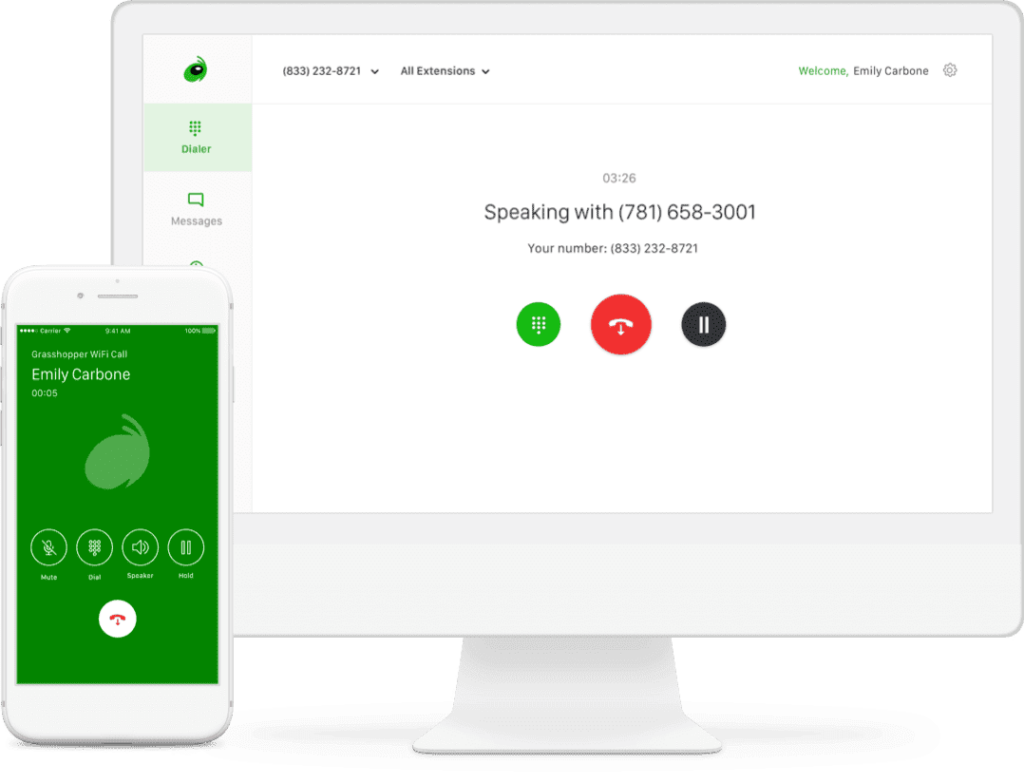
Grasshopper is a virtual phone system designed for early-stage small businesses and solopreneurs. It offers features that streamline communication and enhance professionalism.
Key Features:
- Unlimited calling and texting within the US on some plans
- Call forwarding and voicemail.
- Simultaneous call handling with call routing
- SMS functionality
- Instant response messages for missed calls
Most Helpful User Review:
“I love how convenient and professional the platform/service is. They allow you to forward calls, make calls, and have department extensions,” User, Capterra.
Why We Like It:
Grasshopper is great for solopreneurs and small businesses that want to look professional without a physical office. For example, you can add a business number to your personal phone number and easily separate your work calls.
3. RingCentral
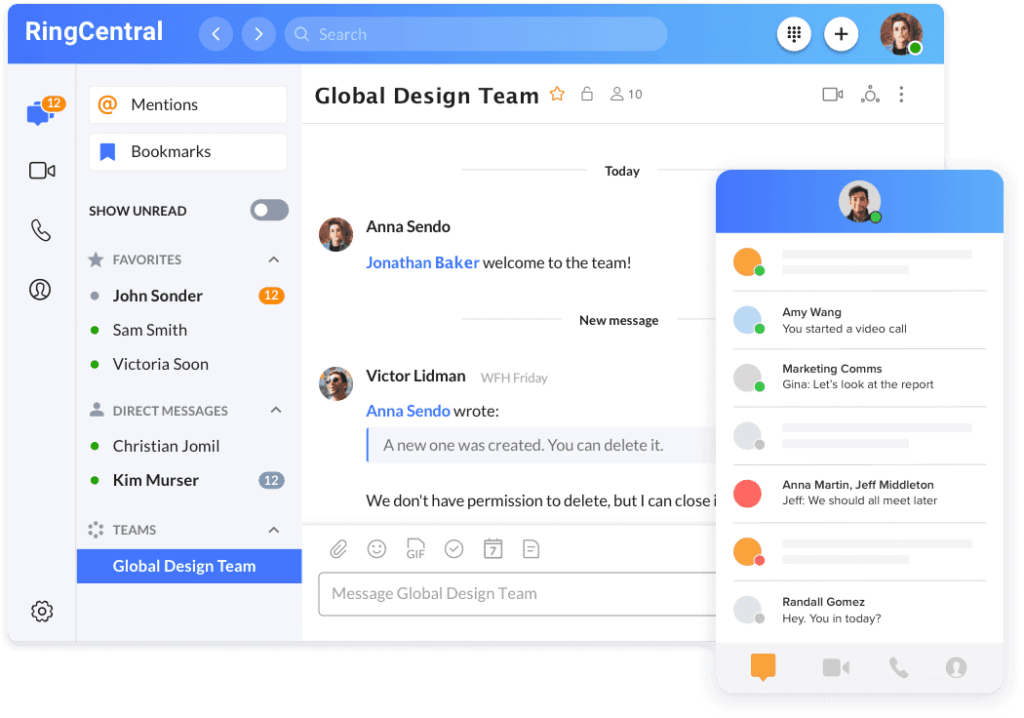
RingCentral offers a comprehensive suite of communication solutions, including video calling, faxing, and phone service. Like CloudTalk, they also offer AI-powered tools for analyzing call center metrics.
Key Features:
- Automated workflows
- CRM integrations
- Messaging tools
- Video meeting solution
- AI tools such as sentiment analysis
Most Helpful User Review:
“Tons of features, not only replaced the phone system but helped the business to operate on a higher level,” User, Capterra.
Why We Like It:
RingCentral has strong video software with features like screen sharing, recording, virtual backgrounds, and breakout rooms.
4. Phone.com
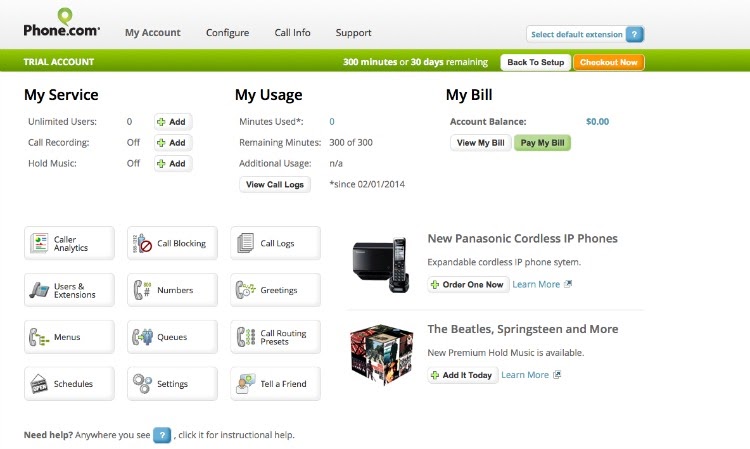
Phone.com is a simple and affordable communications solution that’s built for small teams. With HIPAA compliance, it’s especially suited for industries like healthcare, legal, and retail.
Key Features:
- Basic call routing
- Voicemail
- Caller ID customization
- Call recording
- Add-ons including call analytics
Most Helpful User Review:
“Phone.com does everything I was looking for in a VOIP. As a small business owner, it sure beats having to purchase a stand-alone phone,” User, Capterra.
Why We Like It:
Phone.com supports small teams with easy set-up. It also offers agents who can greet callers, transfer calls, take messages, and schedule appointments.
5. Ooma
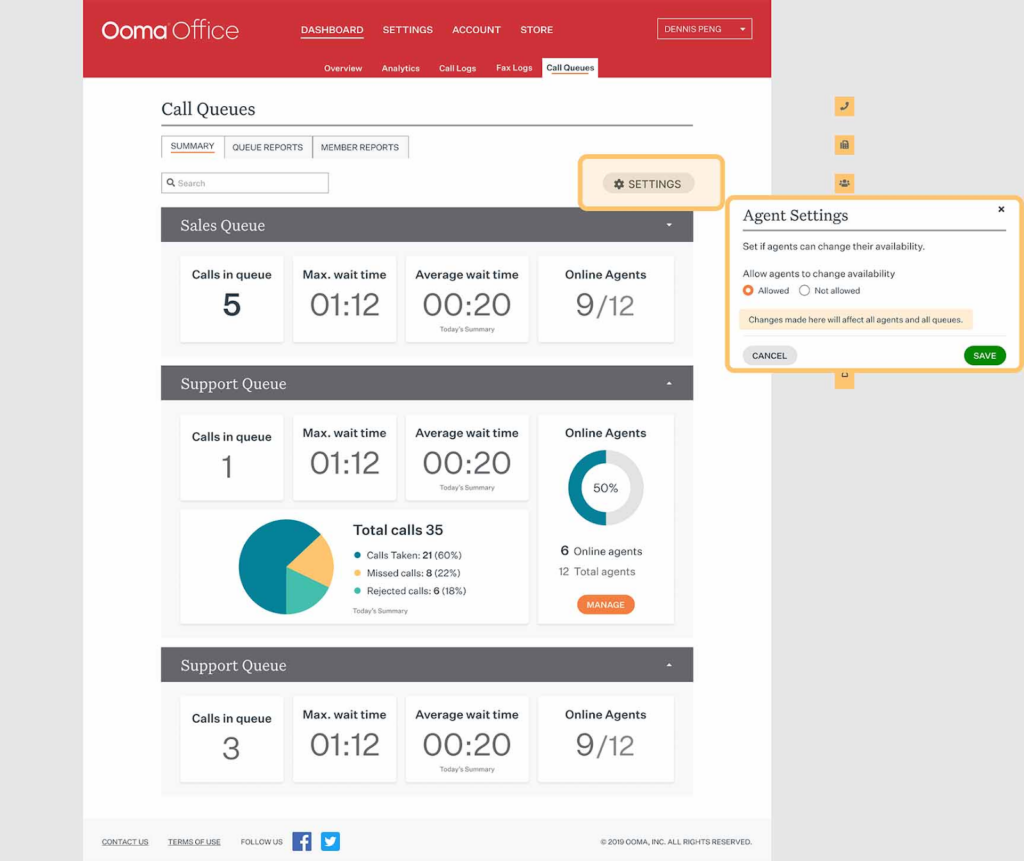
Ooma offers an all-in-one communications service provider with fax, video streaming, text messages, and calling. Plus, you can easily add many phone lines since you can set everything up yourself.
Key Features:
- Call queuing
- Call recording
- Call blocking
- Virtual receptionist
- Integrations with mobile apps
Most Helpful User Review:
“The software is intuitive. It is easy to set up, and the app makes texting customers easy and straightforward,” User, Capterra.
Why We Like It:
Ooma is a straightforward solution for service providers looking to take calls on the go. In particular, the multi-ring feature is helpful for this since it allows calls to go through to mobile.
6. Zoom Phone
Zoom Phone is built on top of the regular conferencing platform, helping businesses manage their communications seamlessly. This means it offers a very user-friendly dashboard and is easy to set up.
Key Features:
- Call routing
- Voicemail
- Call recording
- Integrated meetings and messaging
- Unlimited talk
Most Helpful User Review:
“Zoom has good features and is easy enough to figure out without much training,” User, Capterra.
Why We Like It:
Zoom Phone works well as you scale because you can easily add new users and choose from flexible pricing plans.
7. Verizon
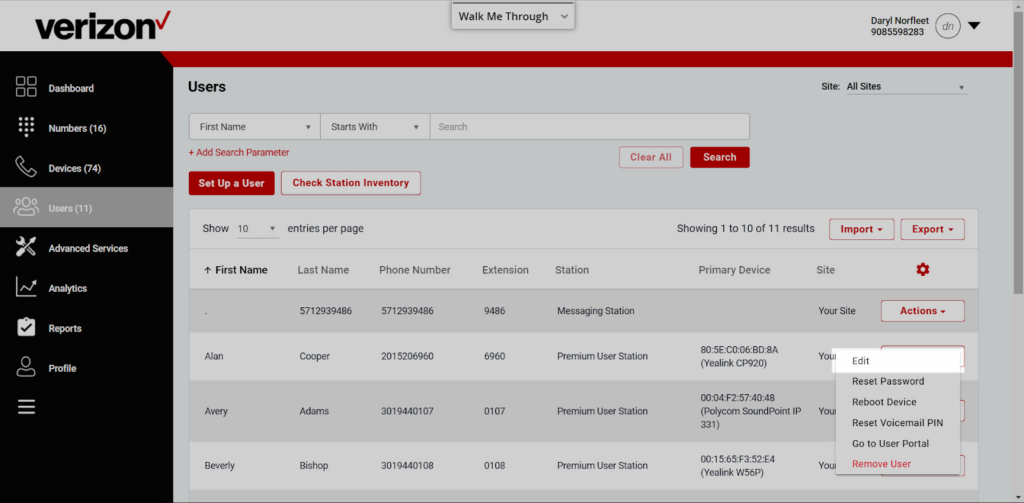
Verizon is a large-scale provider of phone services, TV, and high-speed data solutions. They’ve been established for many years so you can rely on them for consistent performance.
Key features:
- Call forwarding
- Call recording
- Call routing
- Call history
- Mobile integration
Most Helpful User Review:
“I appreciate the options that this company offers for its customers! Great and useful service,” User, Capterra.
Why We Like It:
Verizon phone plans are great for customers who are already integrated into Verizon’s wider ecosystem of solutions since they can all be managed through a single dashboard.
8. Google Voice
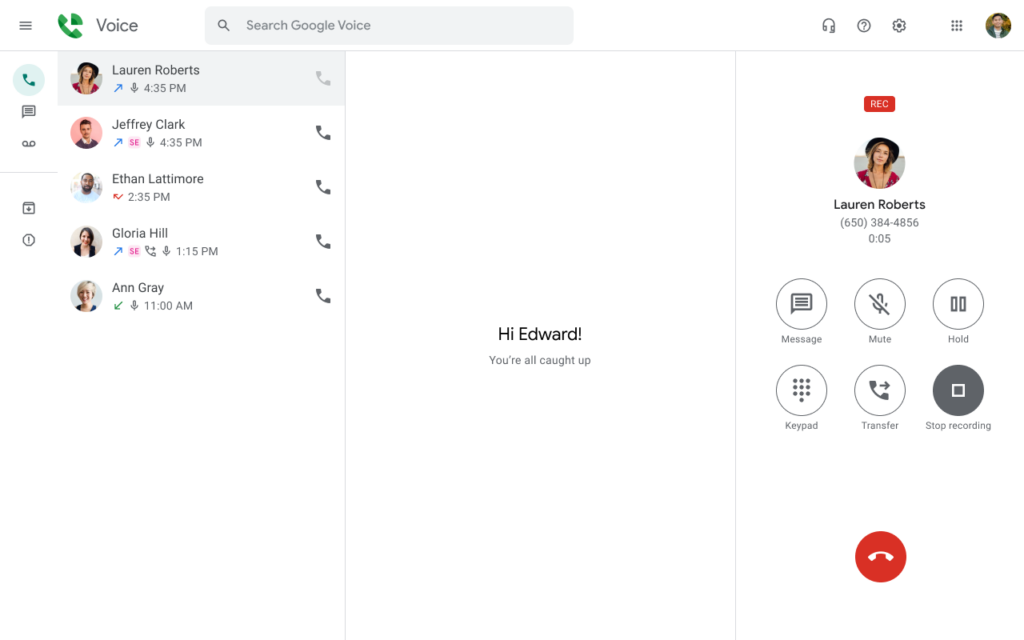
Google Voice is a cloud-based VoIP service that’s used predominantly by users of Google Workspace. It provides a simple way to handle calls, texts, and voicemails from various devices.
Key Features:
- Call forwarding
- Voicemail
- Unlimited text messaging
- Call blocking
- Call routing
Most Helpful User Review:
“Google Voice is simple and straightforward,” User, Capterra.
Why We Like It:
Google Voice is great for small businesses, freelancers, and entrepreneurs who need a low-cost and easy-to-manage phone system.
9. AT&T
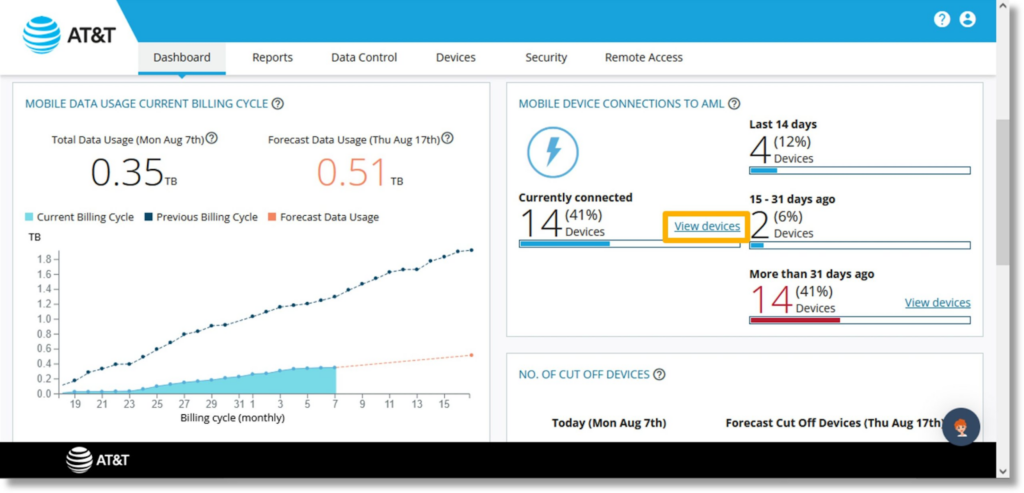
AT&T is a large telecommunications provider, selling mobile devices, internet solutions, and business phone plans. This means their solution comes with no contract required for a little extra flexibility.
Key Features:
- Voicemail
- Call forwarding
- Call blocking
- Caller ID
- Three-way calling
Most Helpful User Review:
“AT&T lets me work no matter where I’m at without having to be in an office at all times,” User, G2.
Why We Like It:
AT&T is great for larger or growing teams because of its integrated phone, fax, messaging, and conferencing system, AT&T Office@Hand.
10. Vonage
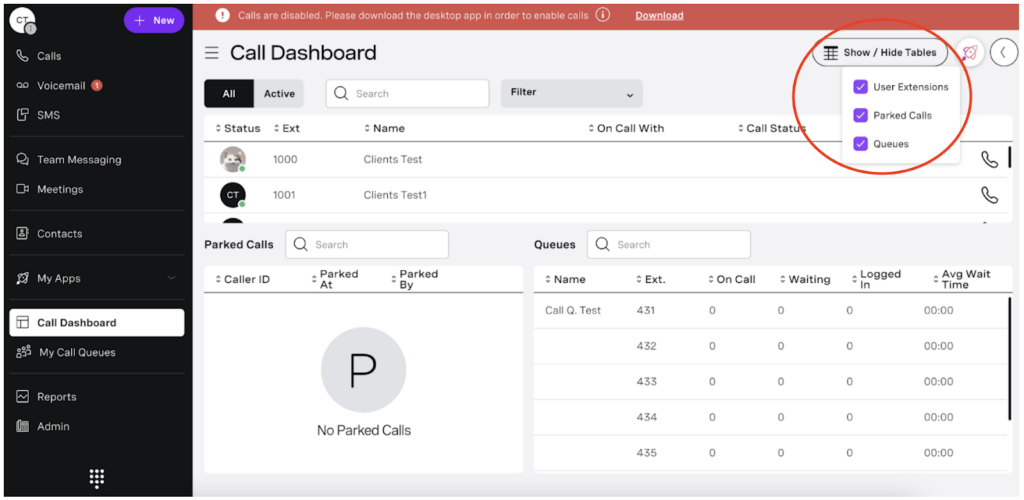
Vonage is a unified communications solution that integrates voice, SMS, video conferencing, and team messaging with a VOIP service. It’s known for helping small to midsize businesses create omnichannel experiences.
Key Features:
- Call screening
- Call recording
- Extensive analytics
- Dozens of integrations
- Voicemail
Most Helpful User Review:
“I definitely recommend this software and even though it might seem a bit more expensive than others in the market, their quality is definitely worth it,” User, Capterra.
Why We Like It:
Like CloudTalk, Vonage provides Call Center Monitoring tools to help you train and coach your sales team.
Choosing the Right Small Business Phone Plan
As you start out, solutions with more basic functionality, such as Ooma and Phone.com, will work well. However, as you begin to scale, you might find they don’t have the features you need to stay competitive by monitoring performance and optimizing customer experience. At this stage, solutions like RingCentral and Vonage with more advanced feature sets come in.
However, the best business phone plans are scalable from the start, allowing you to access a variety of features right away and adjust the number of seats as your needs change. Solutions like CloudTalk scale alongside your team and shifting priorities, ensuring excellent call quality and customer satisfaction from day one.
Scale your business with all the features you need, without seats you don’t.
Sources
*Salesforce, 2024
FAQs about small business phone plans
What are examples of small business mobile plans?
Small business mobile plans give access to all the features you need in a way that’s affordable, flexible, and scalable.
For example, CloudTalk gives small businesses access to automated features, data insights, and dozens of integrations, but offers an adjustable seat count for businesses as they grow.
What are the best small business phone plans?
When selecting a phone plan for your small business, look out for ease of use, call quality, and automated features. These save time and ensure a consistently high customer experience as you scale.











